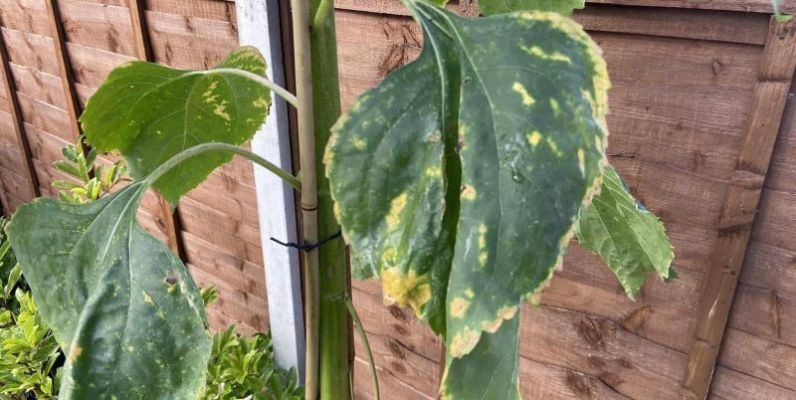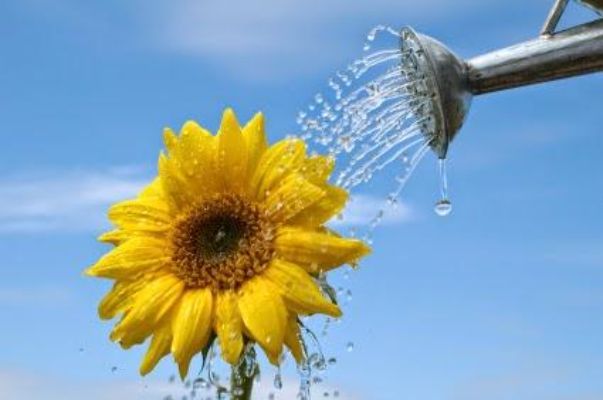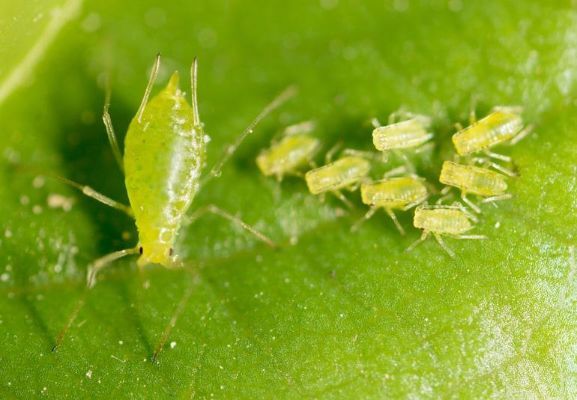In this article, we will explore the causes of yellow sunflower leaves and how to prevent your sunflower so that you can easily grow them in your garden.

Sunflower Leaves Turning Yellow – Here are Some Reasons
Fungal Infection
Fungal infections are common causes of yellowing in sunflowers. Various factors, including improper watering, lack of sunlight, and poor soil quality, can cause these infections. Fungal infections can also be caused by pests such as slugs and snails, which feed on the plant's leaves and cause them to turn yellow or brown.
To prevent fungal infection in your sunflower plants, you should ensure they have access to plenty of water without sitting in it for long periods (a sign that too much water was given). Additionally, you should ensure sufficient sunlight is available at all times; if this is not possible due to the climate where you live, consider moving your plants indoors during colder seasons so they get adequate sunlight each day.
Water Problems

Sunflower leaves turning yellow is a common problem. It's often caused by problems with the plant's water supply.
When a sunflower plant has too much water, it can experience root rot, which will cause the leaves to turn yellow. The same happens when there needs to be more water available for your sunflower to use in its roots.
Nutritional Imbalance
Three main elements contribute to leaf coloration: nitrogen, phosphorus, and potassium. These are nutrients plants need for photosynthesis, which produces glucose molecules that turn into energy for the plant. A lack of any of these elements will cause yellowing as it prevents growth or slows it down significantly.
These nutrients are usually found in soil but can also be supplemented via fertilizer (which contains them) or by adding composted manure or other organic materials like peat moss or coco coir to your growing medium (soil).
Too Much Nitrogen
Nitrogen is an essential nutrient for all plants, but too much can cause the yellowing of the leaves and other problems.
If you've been over-fertilizing your sunflowers with nitrogen-rich organic matter or synthetic fertilizer, they may suffer from nitrogen toxicity.
Insects

Insects could cause the yellowing of your sunflower leaves. Aphids and spider mites, both tiny bugs, can cause yellowing and browning of the sunflower leaves. Insecticides may be used to control these pests if they become a problem.
Viral diseases are caused by viruses transmitted either through airborne particles containing disease-causing agents such as pollen from infected flowers or insects carrying them from one place where someone already planted these seeds elsewhere with lots more infected plants nearby because no one bothered checking anything before buying new seeds every year instead!
Excessive Heat
Sunflowers are sensitive to heat. If you reside in a hot climate and the temperature goes above 100 degrees, your sunflowers will wilt and turn yellow.
If your plant is wilting because of heat, there are some things you can do to help it out. The easiest solution is just moving the plant to a shadier area.
Poor Soil Quality
You might have plants with yellowing leaves if the soil didn't drain properly. The roots need oxygen, and when they don't get it, they die and turn black. They will only be able to absorb nutrients well if the soil is wet or dry for long periods.
Several things can cause poor drainage:
- Soil with poor drainage due to soil compaction from heavy equipment or foot traffic;
- Leaky water pipes that run parallel to your garden (depending on where your sunflowers are planted);
- Clay soil (clay particles aren't large enough to let air in between them). Clay soils need more organic matter added, so they're less dense and more porous.
Watering with Hard Water Can Cause Yellow Spots on Leaves
Hard water contains minerals and salts that can build up on the leaves. Test your water immediately if you suspect that your sunflowers are being affected by hard water. If it has a TDS (total dissolved solids) level of more than 250 parts per million (ppm), you will need to treat it before watering your sunflowers. To do so, you can use an ion exchange unit or softener to remove some of these minerals from your tap water before you use it for watering plants such as sunflowers.
How to Prevent Yellow Sunflower Leaves?
Watering the Plant
Water your sunflowers early in the day, so the leaves have time to dry before dusk. Water at the soil level, so the foliage doesn't get wet.
Create Gap between Plants
Space your sunflowers, so they provide some shade for each other.
Sunflower leaves can turn yellow if they don't get enough sunlight. Sunflowers need at least 6 hours of sunlight per day and grow up to 10 feet tall, so you may need to space your sunflowers, so they provide some shade for each other.
Use Proper Fertilizer
Fertilize with an organic fertilizer like compost or fish emulsion, not a chemical fertilizer like ammonium sulfate.
Improve Bad Drainage
If you have bad drainage, improve it. Use a drainage layer like gravel or sand in the bottom of your pot to help water drain out of the soil.
Avoid Overhead Sprinklers
If you're growing sunflowers in an area that gets a lot of rain, the best way to prevent yellow sunflower leaves is to avoid overhead sprinklers. They can introduce pests, diseases, and other problems that will cause your plants to wilt and die.
Choose Sunflower Varieties That Are Resistant to Fungal Disease
To prevent yellow sunflower leaves, you should choose the right variety of sunflower for your planting. Some varieties are resistant to fungal diseases like rust and powdery mildew.
Use Pesticides and Fungicides
To prevent yellowing leaves in your sunflowers, avoid using pesticides and fungicides.
Final Words
We hope this article has helped you identify the cause of your sunflower leaves turning yellow. If you need more assistance, please feel free to comment below, and we will try our best to help.






